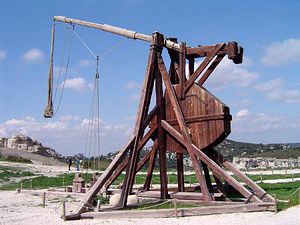Difference between revisions of "Artillery"
m |
m |
||
| Line 1: | Line 1: | ||
[[Image:SU-85.jpg |thumb|right|Soviet SU-85 Self Propelled Artillery Vehicle]] | [[Image:SU-85.jpg |thumb|right|Soviet SU-85 Self Propelled Artillery Vehicle]] | ||
[[Image:Catapult-large.jpg |thumb|right|A Mangonel torsion catapult.]] | |||
[[Image:Catapult trebuchet.jpg |thumb|right|A Trebuchet gravity catapult.]] | |||
'''Artillery''' weapons are designed to launch projectiles at distant targets, using a high-arcing trajectory to shoot over intervening obstacles. | '''Artillery''' weapons are designed to launch projectiles at distant targets, using a high-arcing trajectory to shoot over intervening obstacles. | ||
Early forms of artillery | Early forms of artillery used energy stored in leather ropes or gravity to launch projectiles long distances. Artillery became a major force on the battlefield once gunpowder was invented, leading to the creation of cannons and rockets, substantially increasing its effectivness. | ||
Modern artillery weapons can be [[cannon]]s or [[rocket]]-propelled warheads. Artillery weapons are typically deployed in substantial numbers, allowing them to saturate large areas of a battlefield with explosive ordinance. Proper use of artillery requires a forward observer of some kind to locate targets and relay information about their position and movements to the weapon operators. | Modern artillery weapons can be [[cannon]]s or [[rocket]]-propelled warheads. Artillery weapons are typically deployed in substantial numbers, allowing them to saturate large areas of a battlefield with explosive ordinance. Proper use of artillery requires a forward observer of some kind to locate targets and relay information about their position and movements to the weapon operators. | ||
Latest revision as of 21:50, 26 September 2014
Artillery weapons are designed to launch projectiles at distant targets, using a high-arcing trajectory to shoot over intervening obstacles.
Early forms of artillery used energy stored in leather ropes or gravity to launch projectiles long distances. Artillery became a major force on the battlefield once gunpowder was invented, leading to the creation of cannons and rockets, substantially increasing its effectivness.
Modern artillery weapons can be cannons or rocket-propelled warheads. Artillery weapons are typically deployed in substantial numbers, allowing them to saturate large areas of a battlefield with explosive ordinance. Proper use of artillery requires a forward observer of some kind to locate targets and relay information about their position and movements to the weapon operators.
Artillery in Science Fiction
- In Warhammer 40,000 the Basilisk Artillery Cannon and Tau Skyray Gunships
- Separatist "Defoliator" artillery cannon from Star Wars: The Clone Wars


